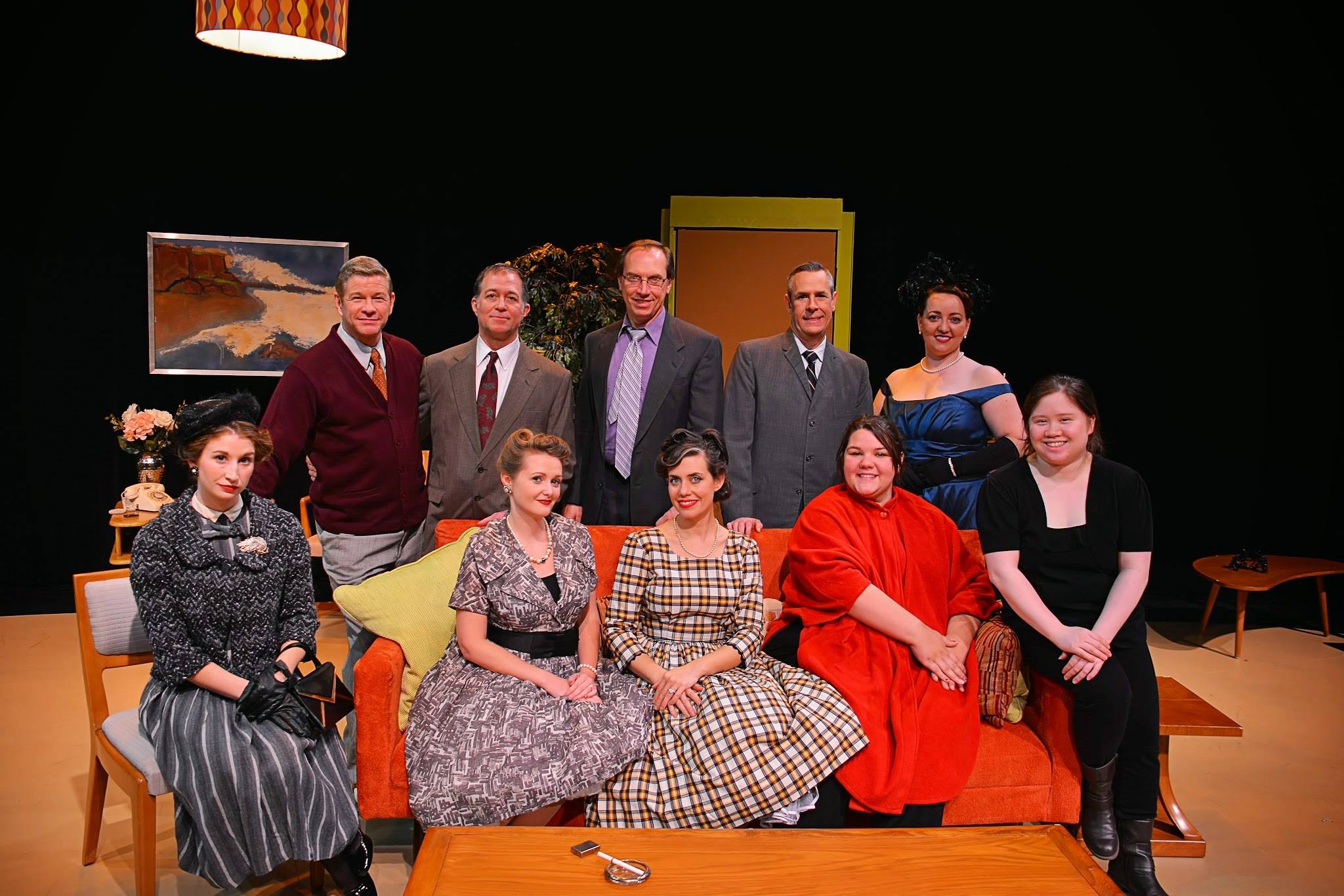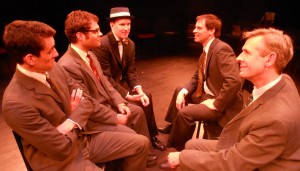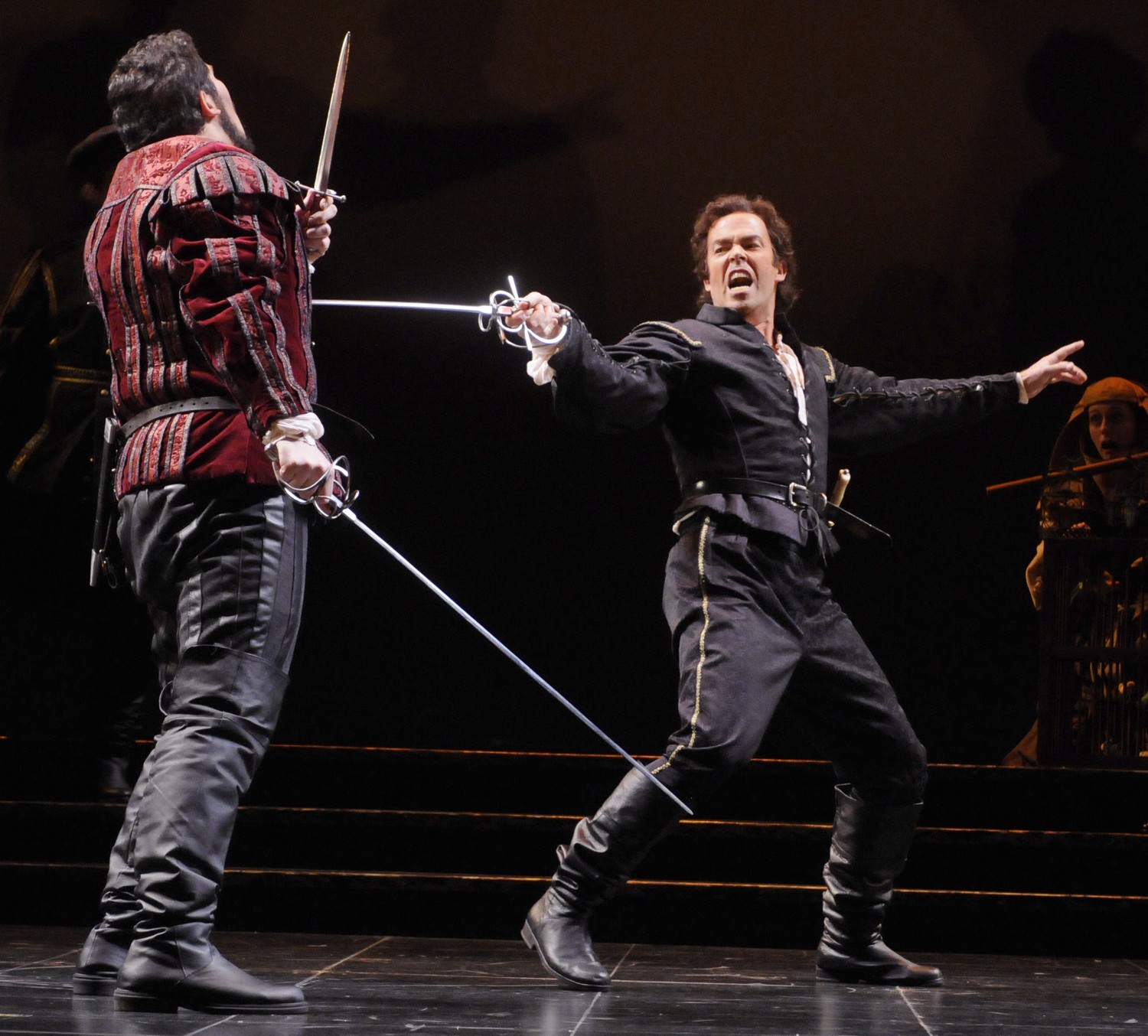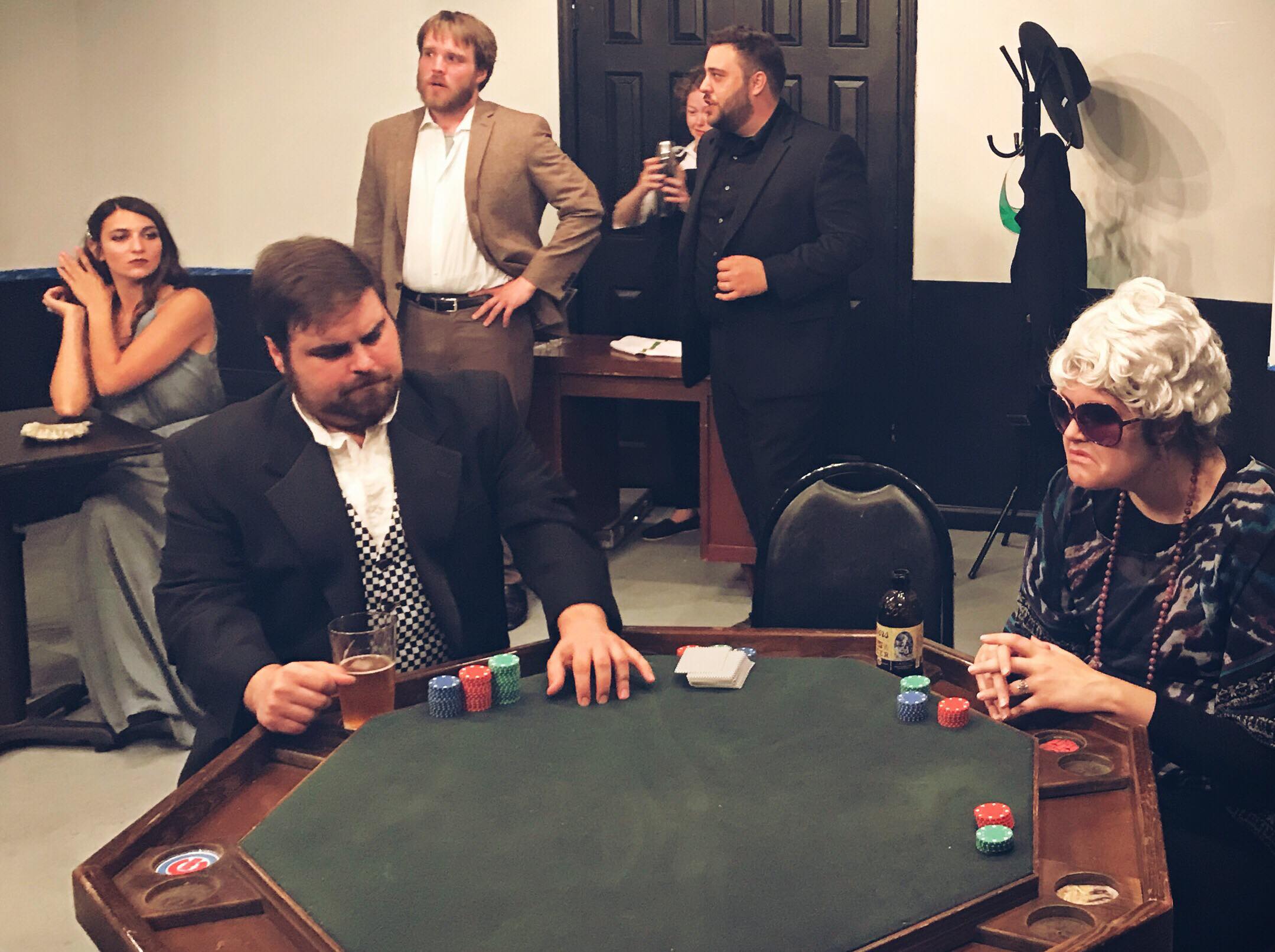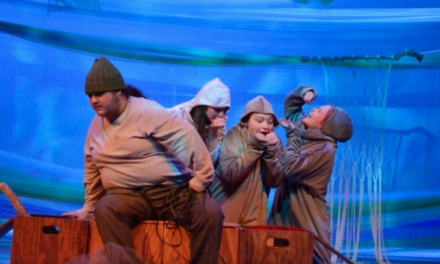Michael Drury with the cast & crew of Perfect Arrangement.
Photo-Michael Taggart
By Keith Waits
Entire contents copyright © 2015 by Keith Waits. All rights reserved.
Since 1995 Pandora Productions has been producing theatre with a focus on LGBTQ themes. The current Artistic Director, Michael Drury, has been with the company for the last 10 years, and is now identified with Pandora to a degree that many people assume he founded the group himself. Recently we talked to him about the past, present, and future of one of Louisville’s most successful theatre companies. He started, as any storyteller would, at the beginning:
Michael Drury: Bo Cecil, Craig Swatt, and Billy Blake Hall founded The Company, because they wanted to create a musical theatre production based on the myth of Pandora. To get some money to fund that project they decided to come together and do a few shows. I think even they would agree now that was probably naive as theatre isn’t always a money making proposition. The plays and musicals that they were doing had a LGBTQ theme to them even though that wasn’t part of the plan.
Eventually Craig and Billy left to pursue other interests. Bo held onto it until 2000 when one day in my living room he said that he wanted to put Pandora in a box and put her on a shelf; he didn’t really like producing and he wanted to pursue other things. Bo and I had been friends for several years and it was through Pandora that we had met. I had done a couple of plays for him by that time.
I hadn’t told anyone that I was restless in my career and life. I was tired of working out of town, touring, never being home and trying to find odd jobs when I wasn’t out of town for acting gigs. So Bo’s announcement in my living room that day was just what I needed to get me off my butt. I had been thinking about trying my hand at producing, so I leapt, not knowing what the heck I was offering to take on.
I told Bo about my ponderings and asked him what he wanted for the company, that I’d like to try my hand. He just laughed and said, “you can have it, there’s no value to put on it, and there’s only a box of paperwork, mostly just a hint of a mailing list, a few props and costumes.”
So, the rest is history. It wasn’t smooth sailing at first because Pandora wasn’t organized the way she currently is with a mission to do LGBTQ themed productions. That is basically all that Bo and that team had done but it didn’t define itself that way. I was interested in doing theatre with a social message but I didn’t think I wanted it to be so specifically targeted.
One day I was sitting with some friends who were advising me and one of them just said, you know with only one exception all the plays and shows that Bo has done to date are LBGTQ themed, clearly Pandora wants to be that. That was the best advice I ever got. From that day forward, there was really no stopping her. In fact, in those early years after that choice was made, she was successful in spite of me. I was a real novice at this and had no idea what I was doing but by some divine guidance we managed to survive and thrive.
Keith Waits: It certainly sounds like you really shaped and refined the company’s mission. Louisville hosts several different theatre companies, most of whom have established some kind of specific identity, but Pandora has arguably the most specific mission statement in town. Do you ever feel as if that limits your choices?
MD: The short answer is ‘yes’, sometimes I do. The more thought out answer is ‘no’, not really. Yes, our mission in some ways limits us, but it certainly focuses us and we have to work harder at finding material that works with other material to formulate and program a season.
We have done some devised pieces, we’ve commissioned pieces, and we’ve held a national new play competition. We’ve gotten creative. We’ve long talked about the possibility of doing plays or musicals that don’t have a LBGTQ theme but are by LGBTQ playwrights and/or composers. Next season we are finally going to do that when we bring Stephen Sondheim’s Passion to the stage to open our 2015-2016 Season. While this doesn’t have a LBGTQ theme, it definitely has something to say to our community. I’m excited to launch this new initiative, one I think we’ll continue in seasons to come.
The biggest challenge in programming for our specific mission is that the landscape of the LBGTQ struggle shifts, not just generationally any more, but sometimes daily. I think playwrights are having a hard time keeping up with it. For example, last season (2013-14) I programmed a season of Marriage Equality themed shows. By the end of the season, marriage bans were being overturned right and left. This happens on other fronts as well, but that has been the most dramatic and rapid.
I think this is sort of old news in our community and our audiences have been telling us that they want new material on new themes. Fortunately for us there have been a lot of LGBTQ themed pieces coming out of New York in the last couple of years. I’m excited to see what’s next.
The new struggle, and I use that word cautiously, since it is good news for the world at large, is that LGBTQ people are more visible now. We are in the mainstream and more and more people are telling our stories on TV, in film and on the stage. While we never feel like we are in competition with other theatre companies in town, when they do a piece that is LGBTQ themed, that’s one less piece we have on our list of possible titles. Of course they can do whatever they want (as I’ve been frequently reminded), and I’m sure they feel like they have something to say through those pieces. A secondary part of our mission has been to only produce ‘rarely seen’ plays. Several years ago we took that phrase out of our mission so that we weren’t bound to produce things that were obscure. However, I still don’t like producing a show again that has been produced recently (within the last five years) on another local stage).
KW: Pandora seems to strike a balance between shows like Naked Boys Singing!, which is a rather obvious example of a mission-specific show, and important contemporary plays that could potentially be produced by any company looking for good material, such as The Temperamentals.
MD: Yes, I think we are quite balanced in our programming. I don’t know about other Artistic Directors, but the tensest time for me, and the time of the year when I lose the most sleep is when I am programming the new season. It is the hardest part of my job. I worry about everything at that time. Is this a good play or musical? Can we bring something to it as artists that hasn’t been done before? Will it fit with the other pieces for the season? Will it be viable at the box office? Can I cast it with the available talent pool?
These are just a few of the worries I have when I program…. and they keep me awake at night. The day the board approves my slate is the day I get the best sleep. And then, the next day I start worrying about something else…usually the same stuff again but now even more intense because we are committed.
KW: You have stepped away from Pandora to direct elsewhere, Escanaba in da Moonlight at Clarksville Little Theatre for example could you imagine Pandora doing a play that did not have explicit themes related to Gay, Lesbian, Bi-Sexual, Transgender or Questioning, but still fit the mission?
MD: I’ve also directed for Shelby County Community Theatre in the past. I grew up in Simpsonville and went to Shelby County High so that is where my roots are and I love going back there to direct occasionally. I don’t get to very often because I live in New Albany with my husband and Shelbyville is quite a trek. As you know community theatres rehearse for six to eight weeks. That’s quite a long commitment for such a long commute.
But, to answer your question, we are producing Passion next season as mentioned earlier. Not only is this chamber opera outside our mission a bit, it is also a very ambitious piece for Pandora. We’ve never been shy about taking on big stuff before so it doesn’t scare me now. The biggest challenge is finding the singers, but that doesn’t scare me either. I try not to choose shows unless I’m sure we can find the talent.
Passion has to do with finding love in shapes and types you wouldn’t expect. The LGBTQ community has a reputation for being superficial and material. I don’t know if that is deserved or not but having never been one of the pretty people, I know what its like to be rejected for my looks. This show is all about that and the surprise when you fall in love with someone who is not your physical ideal. It also deals with what love really is when it is totally unconditional. It’s a marvelous piece of theatre and I think our audiences will be stunned. Plus, who does Sondheim around here? Not many companies will even try.
KW: In any given season you juggle musicals, comedies both subtle and broad, and straightforward drama. How important is it to select a wide range of material?
MD: It’s the MOST important component and very important to me. I personally like variety and want to appeal to the broadest tastes as we try to program a season in which subscribers will want to invest. Of course, we have some subscribers who might only want dramas and others who only want comedies and still others that are only happy when we do a splashy musical. I’m pleased that we have a subscriber base that is loyal and is up for new things, appreciating that we take some risks.
The old adage is true: You can’t please all the people all the time. We do, however, try very hard to do just that. There are some styles that I like a lot, such as Docudrama, like The Laramie Project. As a director I like to rely on the words of a piece and really love telling a story in a simple way, without a lot of trappings. That is the style I love doing most but I know I can’t program a whole season like that and still appeal to the broadest audience.
For several years during the economic downturn we programmed only light material. The times were so serious and for us they were almost fatal. But, as she always has, Pandora rose from the depths and kept hoping. We had a very generous donor make a sizeable contribution and challenge our audience to match it, which, with some serious trimming of expenses, kept us on the boards.
This season we’ve gone back to our roots a bit with more serious fare in Cock and Edith Can Shoot Things And Hit Them. We also produced Perfect Arrangement, a brand new, award-winning play this season. I think that the productions this year have been the right balance. I won’t say the ‘perfect’ balance because I’m not sure what that is. But, we’ve definitely stepped up our game this season and that will continue into next season.
Audiences can always count on seeing something on the Pandora stage that they won’t see anywhere else in town. Even more than our specific mission, I think that’s what sets us apart.
KW: You refer to the fact that Pandora also boasts a meaningful subscription base, which is not something every local theatre company can sustain. Is it simply a matter of having such a specific target audience for your mission?
MD: No, I don’t think so. I wish it were that simple. I think one of the things that keep people coming back and investing in Pandora is what I mentioned earlier, you won’t see the theatre we do anywhere else. I think folks like a variety of things and we definitely have a lot of variety in Louisville. Surprisingly, our subscriber base is quite diverse. We appeal to a broad spectrum of people, including a large percentage of heterosexual couples who say they like to be challenged by the theatre they see and don’t find that in other places.
Seriously, subscribers are the lifeblood of what we do and we try not to ever take advantage of their faith, loyalty and investment in us. Within the confines of still having to make the business work, we work really hard to insure that subscribers are getting the best value, the most savings, the easiest and cheapest (free) exchange policies, and even if we don’t know all of them by name, we recognize them when they come in. Naturally, we love all of the people who invest in an evening with us, because from those single ticket buyers come future subscribers.
I like to think that subscribers are drawn to us initially because we put a consistently great product on our stage. But that great product starts in the culture of the company. We are always in service to our mission: in the boardroom, in the rehearsal hall, in the theatre with the designers and finally when the audience walks through our doors. Our mission is foremost in our minds and is why we do what we do. We feel like we make a difference in people’s lives. That’s what I strive for in my work. I believe that theatre can transform and therefore it became a part of our culture right from the beginning of my time here.
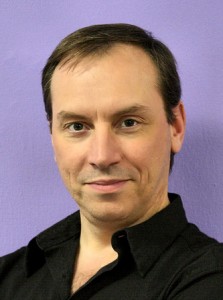 KW: You and your partner Lane live in Indiana and, after a long wait and many court dates, recently were married. What has it been like to be a front-line soldier in the battle for marriage equality?
KW: You and your partner Lane live in Indiana and, after a long wait and many court dates, recently were married. What has it been like to be a front-line soldier in the battle for marriage equality?
MD: Yes, Lane is my husband now! Who would have thought?
Lane and I are both a little uncomfortable with being called soldiers or thinking that we had much at all to do with the shift in marriage equality. We were part of a lawsuit in Indiana, but so were a lot of other people in several different suits brought against the state. In fact, the suit we were part of was thrown out on a technicality and two of the other suits were the ones that went forward. The end result was a victory no matter what suit went on and won in our opinion.
Lane likes to tell people that he got the most unique marriage proposal. We had talked about getting married many times over the years and in fact he had proposed to me long before it was legal. So, when it started moving and we were invited to join this lawsuit that was already in the making we had to decide really fast if we wanted to do it. So, I did what anyone would do in a case like that, I texted him at work and asked him if he wanted to join a lawsuit to force Indiana to marry us, and would he marry me if they decided in our favor.
The next day we were in front of cameras and the news media and we were no longer able to hide on our little cul de sac in New Albany. Was it worth the risks? Absolutely! We’d both do it again in a heartbeat. I think it also has made us even stronger advocates for political involvement and activism. Of course, now that he’s retired he has a lot more time for that than I do.
KW: Does this struggle for social equality for LGBTQ citizens feel like a turning point: the dark before the dawn, if you will?
MD: Yes…and no.
If you had asked me prior to Governor Pence signing RFRA into law I’d have said yes. The Supreme Court heads marriage equality cases for a decision and I’d have bet that it would be a federal right.
Now, after RFRA and the backlash against the Governor I’m not so sure what to think. It’s all so confusing really and so many times through that I’ve felt a little played by politicians. The fact that he signed that law in a closed-door ceremony and the people who were pictured with him, all people who had fought against any LGBTQ issue in the past, it was clearly a law made to placate those interests after marriage equality passed in Indiana. I say passed, but that is not correct, the ban against it was overturned in the courts. The governor and legislature surely fought against that but they lost. So, it really shouldn’t be that surprising to me that they tried to backdoor discrimination in our state.
I get really tired of politicians working against my interest. Lane and I have both been fired up over this. It just reminds us that you can’t take your eyes off of them for a minute.
I do think that the backlash proves without a doubt that the ‘movement’, and I use that word cautiously, has come a long way and the tide has definitely shifted in favor of equality. There is still a lot of work to be done on this front however and we have to stay vigilant. I think we are lucky that we live in a metropolitan area. Those in rural areas are still struggling. We can’t ever forget that as we enjoy so much progress in the cities.
KW: You are closing this anniversary season with Yank!, by Joseph and David Zelnik. What can you tell about us about this “old-fashioned” musical?
MD: I could go on and on about this but I’ll try to keep it brief. I’ve been trying to get this show into our season for four years. It began at a sort of Fringe festival in New York then moved to San Diego at The Diversionary Theatre. The Zelnik brothers and several others spent the next several years trying to get it to Broadway. It had a short off-Broadway run after being work-shopped in 2013 but unfortunately didn’t get any further.
Fortunately for us though it became available and since I had been following its progress and communicating frequently with the producers, as soon as they knew it wasn’t going further, they let me know it would soon be available.
I had fallen in love with it just from the demo CD and manuscript they were kind enough to send me. It’s charming and sweet! It has some exquisite music that you’ll leave the theatre humming! It has love and romance! It has characters you want to take home with you. The show has undergone some changes since I first heard it and read it. Some of the things that were cut I really liked so that has been hard but I know that the cuts and additions are for the greater good of the show as a whole.
The show gets its title from Yank Magazine, which grew to become the most widely read and most popular magazine in the history of the U.S. Army; by the end of World War II, 23 varying editions had been published. At the height of the magazine’s operations, there were editions in Honolulu, Cairo, Tokyo, Okinawa, Rome, Trinidad, Saipan and other places, and the weekly achieved a worldwide circulation of 2,600,000; it is thought to have been read by 10 million readers. The magazine, which was staffed entirely by enlisted soldiers, printed its last issue in December 1945.
Our modern day hero finds an old diary in a junk shop that has some cryptic writings of a World War II writer for Yank Magazine. As he reads from the diary we are transported back to that time and he becomes the hero of the past, Stu, of the musical play. The war becomes a metaphor for his struggle to find himself, his feelings for another man, the other man’s war with himself as he tries to deny his feelings while the real life war rages around them.
The show takes us back and makes us homesick for a simpler time, big band music, the war effort, Hollywood movies and the Hollywood canteen. In fact it is the latter two that inform the concept for the show. It feels like a bit of Hollywood juxtaposed against a war. The themes are somewhat heavy but the atmosphere keeps it light until, like the war, our heroes finally have to decide which side they’re on.
KW: The 2015-16 season is one of the strongest line-ups for Pandora in recent memory: Stephen Sondheim, Harvey Fierstein, Charles Busch; its exactly the kind of mix of material that we have been talking about. I’m especially excited to see you reaching back in time to produce Lillian Hellman’s The Children’s Hour, which is an important play that has sort of been lost?
MD: I’m incredibly excited about the new season and I think you are right it is one of our strongest line-ups after a strong line-up this season. We’ve had to replace one of the shows on our slate for next season. More on that below, but I think the replacement is another very strong selection.
The Children’s Hour was definitely not lost for me. It’s been on my short list off and on over the years. It never seemed to fit until this season for some reason but I’ve loved it since I read it again probably 10-12 years ago after having read it in college in the early 80’s. I read it again while programming this season and saw that it had a revival on Broadway a couple of years ago with Elizabeth Moss and Kiera Knightley in the leads with Ellen Burstyn and Carol Kane in supporting roles. The timing is definitely right for it to finally hit our stage.
We’ve already discussed Passion and how it came to be in our new season line-up. I’m a huge Sondheim fan so anytime we can do something of his I’m up for the challenge. We were one of the only companies to get permission to do a review of his work in Marry Me A Little last season with four actors and we did the historically straight, two person show with four actors, one gay, one lesbian, one trans and one bi-sexual. It was extraordinary and meaningful.
I’ve long been a fan of Charles Busch but since I’ve been with Pandora we’ve not done a Busch piece. I’m glad we are finally changing that next season with Psycho Beach Party. This is an outrageous piece and is sure to please. Some of my favorites in the past have been the really campy pieces. They sure are fun to do.
I’m very pleased that we were able to get the rights to do Casa Valentina so soon after it had its New York run. We really try to get these shows with LGBTQ themes as soon as we can with varying degrees of success. We are still a small company as far as the publishing companies are concerned so it sometimes becomes difficult.
Oddly enough the one show on our slate for next season that we did not get the rights for was probably the one that had the least name recognition for our audience. Choir Boy is on hold by a larger company in the vicinity. I was very excited to bring that to our stage as it dealt with being gay and black, an issue we’ve not explored. It is a great play, maybe in the 2016-2017 season if it doesn’t get produced locally before then.
In its place we will bring to our stage one of the classics of LBGTQ theatre literature, The Boys In The Band. I’ve looked at this piece for many years and again, it didn’t quite fit into any season easily. Next season there are a lot of themes of self-acceptance. It is high time that we bring this classic to our audience I think.
Pandora’s final show of the season is:
YANK!
May 14 – 24, 2015
Pandora Productions
At The Henry Clay Theatre
604 South Third Street
Louisville, KY 40202
For tickets go to: Pandoraproductions.org
[box_light] Keith Waits is a native of Louisville who works at Louisville Visual Art during the days, including being one of the hosts of PUBLIC on ARTxFM, but spends most of his evenings indulging his taste for theatre, music and visual arts. His work has appeared in Pure Uncut Candy, TheatreLouisville, and Louisville Mojo. He is now Managing Editor for Arts-Louisville.com.[/box_light]
Keith Waits is a native of Louisville who works at Louisville Visual Art during the days, including being one of the hosts of PUBLIC on ARTxFM, but spends most of his evenings indulging his taste for theatre, music and visual arts. His work has appeared in Pure Uncut Candy, TheatreLouisville, and Louisville Mojo. He is now Managing Editor for Arts-Louisville.com.[/box_light]

